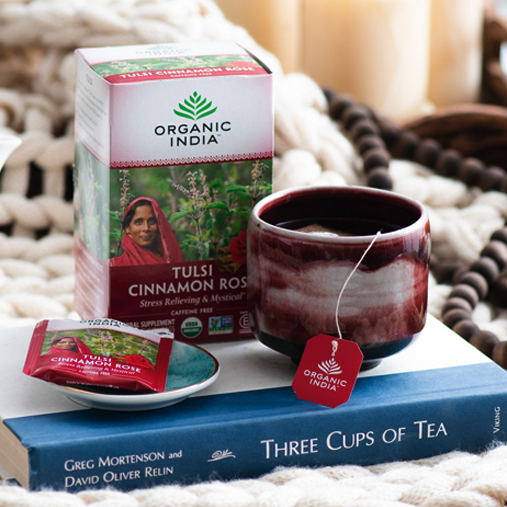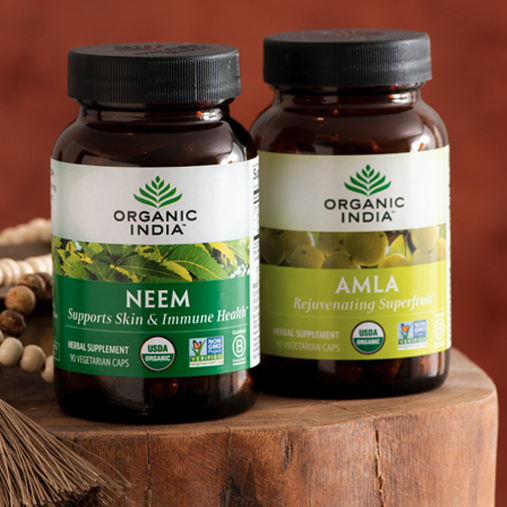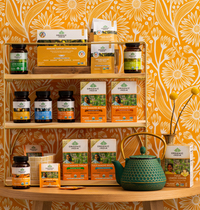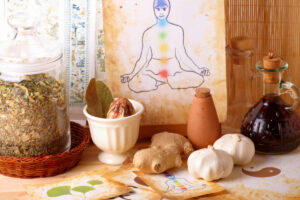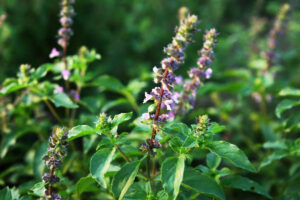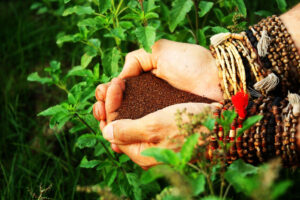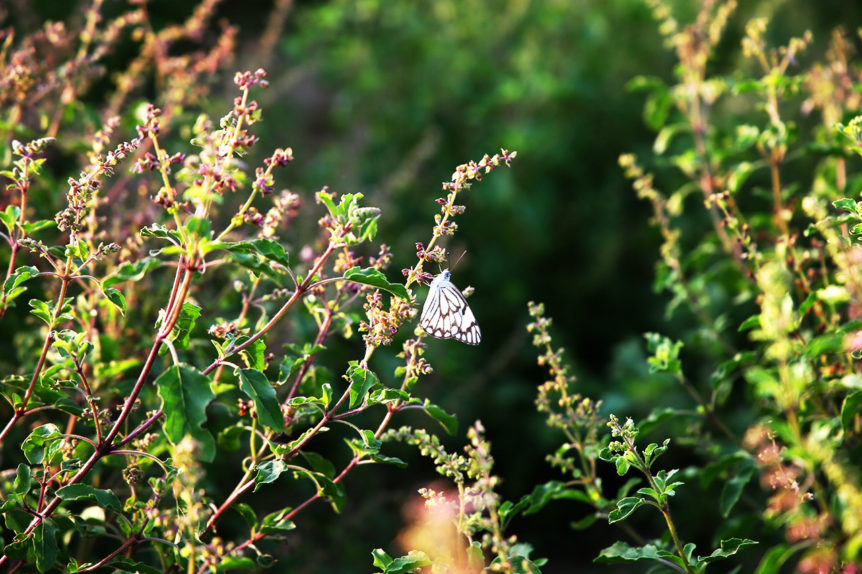Back
When it comes to herbs, tulsi usually isn’t the first thing that comes to mind — but perhaps it should. Tulsi has won its reputation as the “Incomparable One” among Ayurvedic herbs because its health benefits are unparalleled. To this day, Ayurvedic practitioners rely on the plant for conditions from mild to serious.The ancient wisdom of India has taught us that Tulsi acts as a “rescue remedy” by bolstering the immune system.
So what is Tulsi? Tulsi, otherwise known as the holy basil leaf, is a powerful adaptogenic herb, known for reducing stress and increasing energy. While stress is a major factor in lowered energy levels, so are many other facets of modern life — including diets with too much sugar, refined foods, sedentary lifestyles, exposure to toxins, and poor sleeping habits, to name a few.
Adaptogenic Tulsi
Adaptogen researcher, Alexander Panossian, explained that adaptogens were initially defined as substances that enhance the “state of nonspecific resistance” in stress. This is a physiological condition linked to a number of neuroendocrine-immune system disorders. Scientific studies have shown that adaptogens offer neuroprotective, anti-fatigue, antidepressive, anxiolytic, nootropic, and CNS stimulating activity. A number of clinical trials have revealed that adaptogens have an anti-fatigue effect, which gives people a greater threshold for mental exhaustion and enhanced attention.
Increasing our tolerance of stress is helpful, but Ayurveda goes much further in its holistic philosophy, providing needed relief and inner peace. Thus, Tulsi is part of a broader prescription for health that includes meditation, breathing exercises, massage, and the balancing of doshas through the daily diet.
Tulsi: The Meditation Herb
Among Tulsi’s many aggrandizing names, one is “the meditation herb,” which is fitting since it is an herb for mood enhancement. It also is the sacred plant of Vishnu and the essence of the goddess is found within it. For this reason, the plant is ever-present near temples and in Indian homes to sanctify them. Meditating on Tulsi is said to bring goodness, virtue, and joy — all of which are antidotes to modern living.
Antioxidant Benefits of Tulsi
Within the last few decades, researchers have focused on antioxidants’ ability to fight free radicals, which are created through toxins and act as “oxygen-robbers” in the cells. Tulsi basil has been shown to be one of the more powerful antioxidants in the Ayurvedic herbal kingdom. Researchers at the National Institutes of Health explain that antioxidants are natural substances that may prevent or delay some types of cell damage — molecules that react with free radicals to neutralize or terminate the chain reaction that they cause before the body’s vital molecules are damaged.
Tulsi basil has been shown to be one of the more powerful antioxidants in the Ayurvedic herbal kingdom.
The best source of antioxidants is nature’s whole, pure, and nutrient-dense plants. Clean water and fresh air are also integral to the body’s cells. Some plants are more potent antioxidants than others, and Tulsi leaves are certainly among the more powerful cellular protectors.
Researchers Negar Jamshidi and Marc Cohen, School of Health and Biomedical Sciences, RMIT University, Melbourne, VIC, Australia, reported that Tulsi studies attest to the herb’s having multiple therapeutic actions, including adaptogenic, antimicrobial, anti-inflammatory, cardioprotective, and immunomodulatory effects. A review of scientific studies shows that the consumption of Tulsi has resulted in “favorable clinical outcomes, with no studies reporting any significant adverse events.”
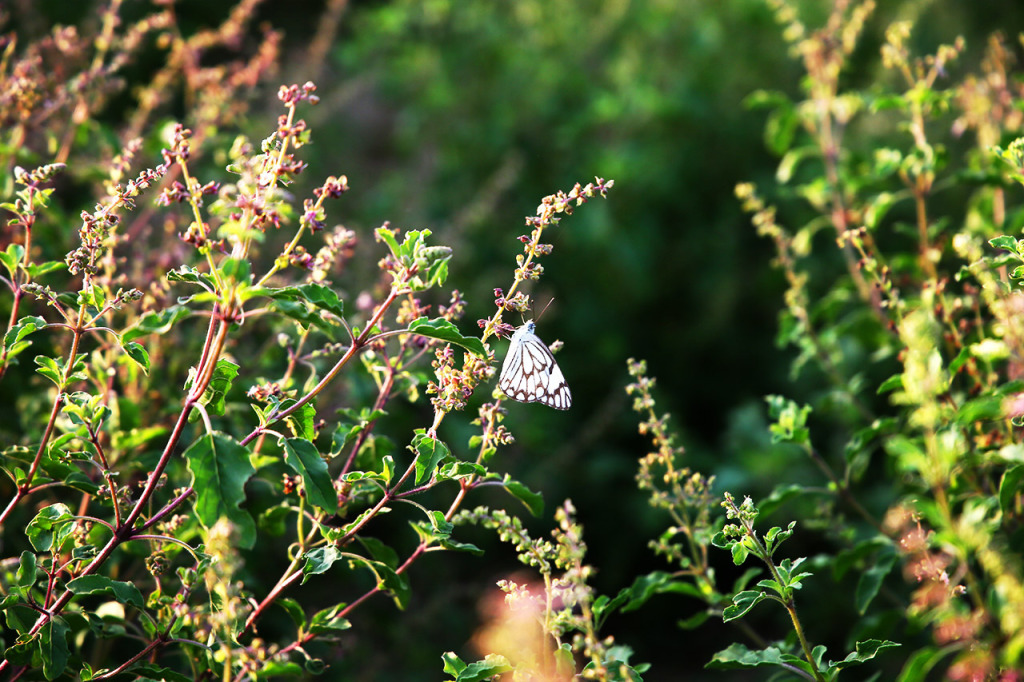
Studies consistently reinforce traditional uses of Tulsi as being effective for lifestyle-related chronic illnesses, including diabetes, metabolic syndrome, and psychological issues. Jamshidi and Cohen concluded that the daily addition of Tulsi to the diet — even as support for ongoing medical treatment — can potentially help with the prevention or reduction of various health conditions.
Addressing Toxins Before They Create Problems
One of the most overlooked factors in health and healing is our constant exposure to toxins. Toxins seem to come from everywhere in modern society, and their relative invisibility makes them a silent source of health concerns. Among these sources are the environment, personal care products, processed foods, foods sprayed with synthetic fertilizers and pesticides, and what we generally call pollution (water, air, and so forth).
We may add to this list one source of toxins that has been with our species down through the ages — metabolic waste. Simply put, this includes the waste our bodies make as a natural result of biochemistry. Such wastes are produced through digestion, naturally occurring cellular breakdown, respiration, sickness, normal wear and tear, and even beneficial exercise.
Fortunately, Ayurvedic doctors have traditionally recognized Tulsi as helping the body process these efficiently. Tulsi supports the colon for healthy elimination, but it also addresses the root causes — the imbalances — that inhibit the body from doing what it knows how to do.
The holy basil leaf is particularly effective with both bodily and emotional digestion. When the body is continually dealing with high levels of cortisol and other hormones, the appetite is often increased. We see this cause-and-effect relationship among individuals who look for comfort foods, raid the refrigerator, and crave junk food.
The result is weight gain, poor digestion, and the increase in the metabolic waste that leads to anxiety, depression, a suppressed immune system, systemic inflammation, and more. Tulsi provides a calming energy that lifts the mood and increases stamina and endurance. While adaptogenic herbs do not alter mood, they help the body function optimally, which in turn positively affects the emotions.
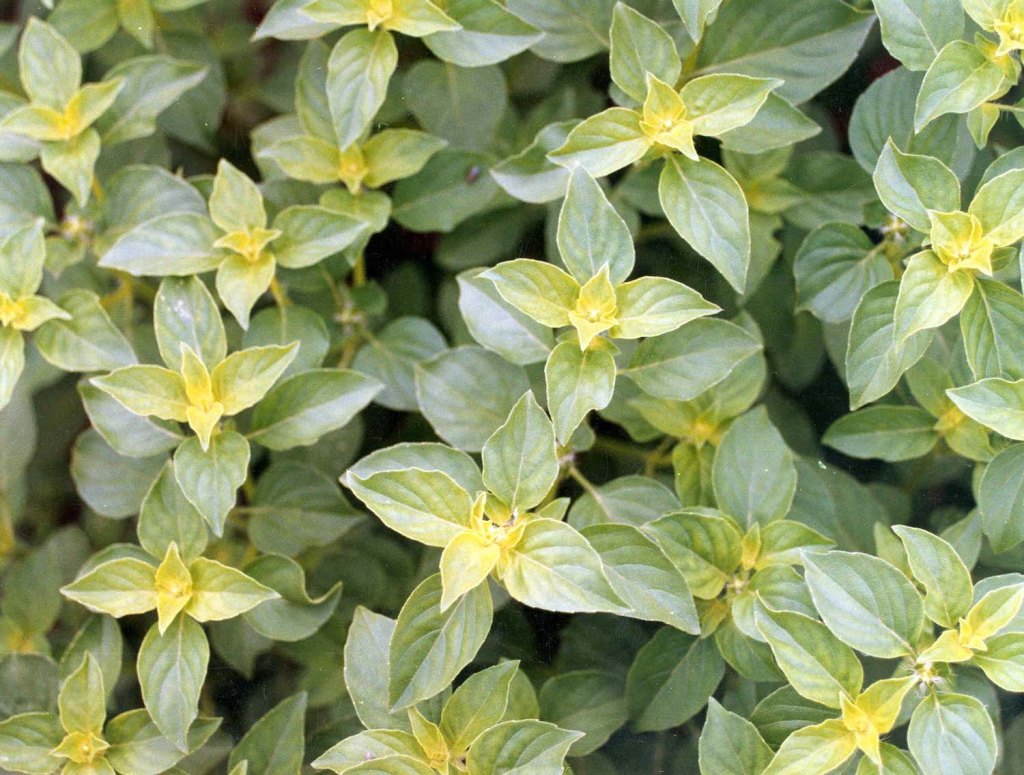
Balancing Blood Sugar and Cardiovascular Health
There are various reasons for experiencing chronically elevated blood sugar (hyperglycemia), including consuming too much sugar and too many refined foods in the daily diet. Regardless of whether a person has prediabetes or type 2 diabetes, it’s imperative to maintain healthy blood-sugar levels — and, write medical researchers for Healthline, all parts of the Tulsi plant work to do so. Studies have shown that the plant may help prevent symptoms of diabetes, such as weight gain, hyperinsulinemia (excess insulin in the blood), high cholesterol, insulin resistance, and hypertension (high blood pressure).
The Dance of Mind and Body
Ayurvedic medicine is inseparable from eastern philosophy, meaning that each illness and its treatment must take into account the interplay between mind and body. There is no health issue that does not involve both, and to treat one without the other is to provide a treatment that is incomplete and unwise.
For anyone who has ever been sick, it is clear that an unwell body affects the mood, behavior, motivation, clarity of mind, and so forth. And for those who struggle, often daily, with emotional or mental strain, there is no denying the toll this takes on the body — manifested in issues ranging from mild to serious. Ayurvedic practitioners take both the mind and body into consideration, and herbs such as Tulsi leaves address both.
Rarely can one herb create such a holistically uplifting effect, which may be why the benefits of Tulsi have earned a noble reputation. So, if you’re curious as to what herb is good for stress, look no further than Tulsi. Even with daily consumption, this potent, adaptogenic herb is deemed safe, making it an important addition to your herbal tea, spice, essential oil, and supplement rack.
Tulsi basil has stood the test of time — attributed for millennia of life-saving and spirit-lifting use in Ayurvedic medicine. Its actions and health benefits benefit the entire being, undeniably serving as the great unifier in nature’s wondrous plant kingdom.

